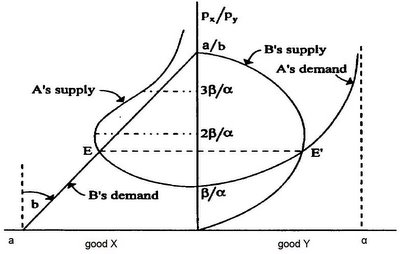…that any Pareto efficient allocation we care to achieve can be achieved as an outcome of markets given a suitable allocation of endowments.What this means in regular English is that you can end up with any distributional arrangement of resources if you are first able to redistribute wealth and then let voluntary exchange take place.
While working on my homework problems, I was pleasantly surprised to be able to solve an example of this theorem mathematically. It got me thinking about whether this concept could help illuminate the theological concepts of predestination and free will?
To explain what I mean, imagine an infinite being (God) with perfect ex ante knowledge, who is able to create individuals and allocate to them whatever resources and preferences he desired. God could then allow man to make volitional choices within these constraints which would result in outcomes God preordained. (Think of this as God’s chosen Pareto efficient allocation for humanity.) As far as I can reason, this neither conflicts with the concept of the sovereignty of God nor with the ability of man to make and be responsible for his choices.
Interestingly, this thought process also illustrates one of the fundamental problems with trying to apply this theorem to arrive at human-designed outcomes through government intervention. To be successful, it would require government to be both all-knowing and all-powerful – essentially assuming government to be a god. Before treading down this dangerous path, we need to remind ourselves that government is merely made up of ordinary mortals who are limited in both knowledge and ability -- just like you and me...

No comments:
Post a Comment